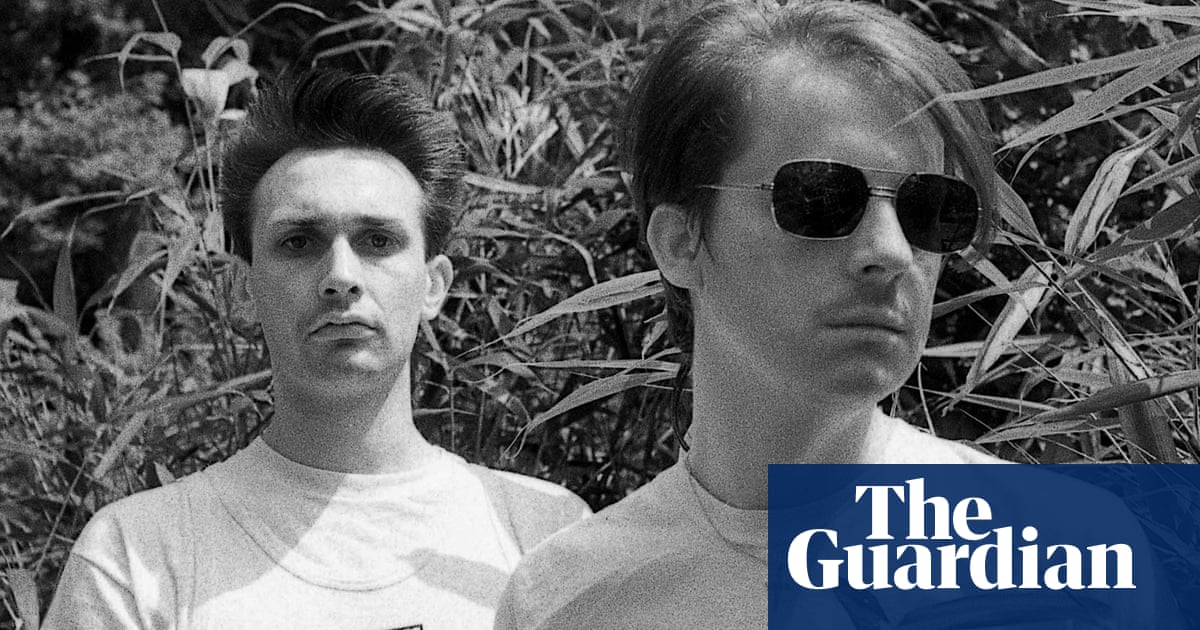
Show caption ‘A towering creative genius’ … L-R Stephen Mallinder and Richard H Kirk of Cabaret Voltaire. Photograph: David Corio/Getty Images Music Richard H Kirk, founding member of Cabaret Voltaire, dies aged 65 Influential member of experimental Sheffield band, known for their provocative performances, also maintained a prolific solo career Laura Snapes Tue 21 Sep 2021 15.35 BST Share on Facebook
Share on Twitter
Share via Email
The influential British electronic musician Richard H Kirk, best known as a founding member of Sheffield group Cabaret Voltaire, has died aged 65. Mute Records, which released several of Kirk’s solo albums and albums by the band, confirmed the news, describing him as a “towering creative genius who led a singular and driven path throughout his life and musical career”.
Robin Rimbaud, AKA electronic musician Scanner, paid tribute to Kirk’s work with Cabaret Voltaire: “Connecting the experimental side of Roxy Music with William S Burrough’s cut up techniques, their The Voice of America (1980) and Red Mecca (1981) remain utter gems of exploratory sound today.”
Kirk, along with Chris Watson and Stephen Mallinder, formed the group in 1973, taking their name from the Zurich nightclub that birthed the Dadaist movement and forging their sound via experiments combining music and technology. “Technology was always a catalyst,” Kirk told the PRS in 2016. “It allowed you to do things, especially if you weren’t the world’s best musician.”
They became known around Sheffield in the late 70s for their provocative live performances, and frequent support slots with Joy Division. The latter’s Bernard Sumner, later of New Order, cited the group among his musical influences, and Depeche Mode and Bauhaus considered them peers.
They were absorbed into the emerging punk movement and founded a recording studio, the Western Works – a former cutlery factory – which acted as a hub for the Sheffield punk scene. The producer Flood made early material there, and it was the site of New Order’s first recordings after the death of Joy Division frontman Ian Curtis.
Kirk once described his early motivation to make music as “boredom” stemming from the absence of distraction in early 1970s Sheffield. “You had to find your own entertainment, which turned out to be making weird electronic music.”
The band signed to Rough Trade in 1978 and became beloved of peers such as Gang of Four’s Andy Gill. Watson left the band in 1981 and Kirk and Mallinder spent the subsequent decade bouncing from Virgin to EMI, exploring pop music, with hits such as Sensoria and I Want You, along with house and techno, to varying degrees of satisfaction among the remaining members.
“After Chris Watson left we carried on in a totally different direction,” Kirk told the Irish Times last year. “A lot of people said it was rubbish. Fortunately, I think it has stood the test of time.”
808 State tweeted in celebration of the diversity of Cabaret Voltaire and Kirk’s attitude to electronic music: “The Cab’s DIY approach was an early inspiration of what to do with synths in the 70s, then the ease at which [Kirk] entered into the 90s club culture without having to change his game much.”
Kirk maintained a prolific solo career alongside Cabaret Voltaire – once describing it as a combination of having too many ideas and “taking a lot of amphetamines” – using dozens of aliases such as Bit Crackle, Destructive Impact, Dr Xavier, PSI Punky Dread Allstars and Wicky Wacky. After Mallinder moved to Australia in 1995 and the band activity stalled, Kirk continued his solo career.
He revived the Cabaret Voltaire name in 2009 for a series of collaborations and live performances, and in 2020 released an album, Shadow of Fear, the first with Kirk as the sole band member. He was adamant that it was not an exercise in nostalgia.
“I’ve been a big fan of Miles Davis for many years and he would never play anything from the past and the only time he ever did that was before he died,” he told Fact magazine in 2017. “I just feel like, what’s the point? … I always make it really clear that if you think you’re going to come and hear the greatest hits then don’t come because you’re not. What you might get is the same spirit.”
{{topLeft}} {{bottomLeft}} {{topRight}} {{bottomRight}} {{/goalExceededMarkerPercentage}} {{#goalExceededMarkerPercentage}}{{/goalExceededMarkerPercentage}} {{heading}} {{#paragraphs}} {{#ticker}}{{/ticker}}{{#paragraphs}} {{.}} {{/paragraphs}} {{highlightedText}}
{{#choiceCards}}
Single Monthly Annual
Other {{#cta}} {{text}} {{/cta}} Email address Please enter a valid email address Please enter your email address Set a reminder Sorry we couldn’t set a reminder for you this time. Please try again later. . To find out what personal data we collect and how we use it, view our We will send you a maximum of two emails in. To find out what personal data we collect and how we use it, view our Privacy Policy . If you have any questions about contributing, please We will be in touch to remind you to contribute. Look out for a message in your inbox in. If you have any questions about contributing, please contact us {{/paragraphs}}{{#choiceCards}}{{/choiceCards}}







